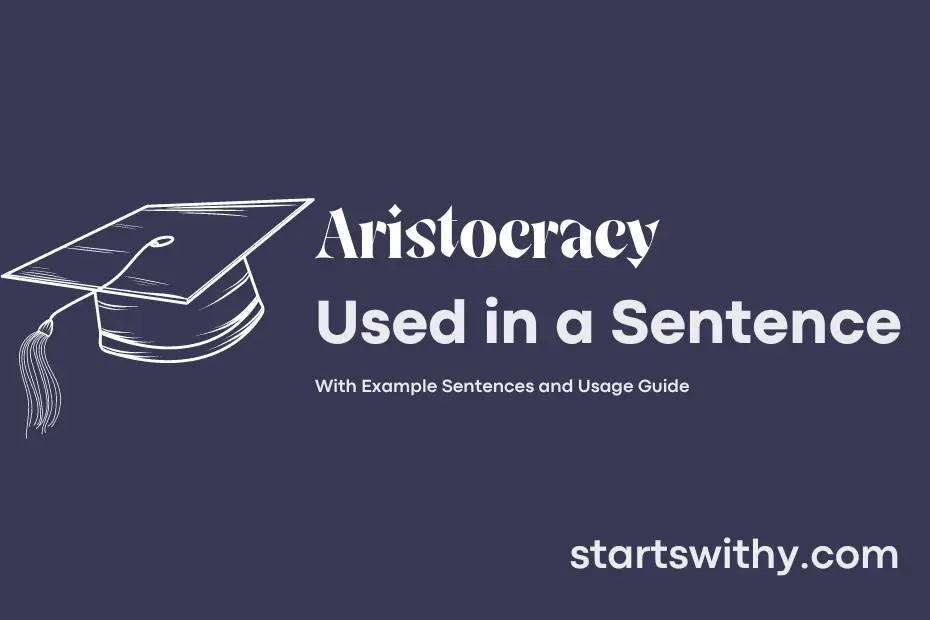Are you curious about the concept of aristocracy? In simplest terms, aristocracy refers to a social class that holds power and privilege based on hereditary status or wealth. Members of an aristocracy typically have a certain level of influence and authority in society.
Historically, aristocracy played a significant role in shaping governance and social structures in many cultures around the world. Understanding the characteristics and dynamics of aristocracy can provide insights into how societies have been organized and governed throughout history.
7 Examples Of Aristocracy Used In a Sentence For Kids
- Aristocracy means a group of rich and powerful people.
- Some countries have a system with an aristocracy.
- Kings and queens are part of the aristocracy.
- Long ago, only the aristocracy could own land.
- The aristocracy lived in grand palaces and wore fancy clothes.
- Children of the aristocracy were taught by private tutors.
- In olden times, the aristocracy had servants to help them.
14 Sentences with Aristocracy Examples
- Aristocracy is a form of government in which power is held by a small, privileged class.
- Studying the history of aristocracy can give insight into social structures and power dynamics in different time periods.
- Understanding the concept of aristocracy can help in analyzing class hierarchies in literature and society.
- Debating the merits and drawbacks of aristocracy can be a thought-provoking topic for a college seminar.
- Exploring the influence of aristocracy in shaping political systems can provide valuable perspective on governance.
- Comparing the role of aristocracy in different cultures can lead to a better understanding of societal norms and values.
- Examining the impact of aristocracy on economic policies can shed light on wealth distribution and inequality.
- Reflecting on the privileges associated with aristocracy can prompt discussions on social justice and equity.
- Analyzing the downfall of aristocracy in certain historical contexts can reveal the fragility of power structures.
- Considering the resurgence of aristocracy in modern society can raise questions about class mobility and elitism.
- Discussing the role of aristocracy in shaping education systems can highlight disparities in access and opportunities.
- Reflecting on the evolution of aristocracy in India can provide insights into the country’s colonial past.
- Exploring the representation of aristocracy in Bollywood films can offer a glimpse into popular perceptions of wealth and status.
- Debating the relevance of aristocracy in contemporary Indian society can spark conversations about identity and social mobility.
How To Use Aristocracy in Sentences?
To use the word Aristocracy in a sentence, you can start by identifying a group of people that holds a high social status based on their family lineage or wealth. Here’s an example sentence:
“The members of the royal family belonged to the highest Aristocracy in the country, enjoying privileges and power that were unavailable to the common citizens.”
When using the term Aristocracy, it is important to recognize that it refers to a specific social class that is typically associated with hereditary nobility and inherited titles. You can also elaborate on the characteristics or behaviors commonly associated with the Aristocracy, such as sophistication, privilege, and exclusivity.
For instance, you could say: “The grand ballroom was filled with the elite of Aristocracy, draped in luxurious gowns and sparkling jewels, exuding an air of refinement and opulence.”
By incorporating Aristocracy into your writing or conversation, you can convey a sense of social hierarchy, class distinction, and historical tradition. Remember to use the word in context to accurately reflect its meaning and significance. Practice incorporating Aristocracy into various sentences to become more comfortable with its usage and deepen your understanding of its connotations.
Conclusion
In conclusion, sentences involving the concept of aristocracy often refer to a social class of noble or elite individuals who hold power, wealth, and privilege. These sentences underscore the hierarchical structure of societies where aristocrats historically held significant influence over politics, economics, and culture.
Through the use of sentences featuring aristocracy, we can explore themes such as privilege, inherited status, and the dynamics of power within societies. These sentences provide insight into the historical and social contexts that have shaped the role of aristocracy, shedding light on the complexities of class distinctions and their impact on various aspects of human civilization.



